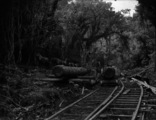Price's Bush Tramway
| Price's Bush Tramway | ||||||||||||||||||||||||||||||||||||||||
|---|---|---|---|---|---|---|---|---|---|---|---|---|---|---|---|---|---|---|---|---|---|---|---|---|---|---|---|---|---|---|---|---|---|---|---|---|---|---|---|---|
 | ||||||||||||||||||||||||||||||||||||||||
| Technical | ||||||||||||||||||||||||||||||||||||||||
| Track gauge | 3+1⁄2 or 4 ft 1,067 or 1,219 mm | |||||||||||||||||||||||||||||||||||||||
| ||||||||||||||||||||||||||||||||||||||||
Price's Bush Tramway was a bush tramway built around 1903 near Akatarawa in the Tararua Range of New Zealand's North Island. It was built with a raised Fell third rail for braking the loaded trucks, as used by the Rimutaka Incline.
History
[edit]Price's Bush was an area owned and milled by Thomas Price (1838–1906), who owned milling operations in Lower Hutt and Petone.[1] It lay in the upper reaches of the Hutt Valley to Waikanae on the Kāpiti Coast in a rugged hill country.[2]
The tramway had wooden rails with a track gauge of 3+1⁄2 or 4 feet (1,067 or 1,219 mm) equal to that of the main line or Wellington tram respectively. Between the two rails, on which the wheels ran, there was a raised wooden rail. This was used for braking the loaden trucks downhill, as known from the Fell mountain railway system on the Rimutaka Incline.
-
Bush tramway showing wooden rails in Price's Bush at Akatarawa, 1903
-
Transporting logs with horses in the Akatarawa Bush, Hutt Valley, 1912-1916
Additional literature
[edit]- Tony Walzl: Akatarawa and Pakuratahi Forests History.
References
[edit]- ^ Bush tramway showing wooden rails, at Akatarawa, Price's Bush, circa 1903. A P Godber Collection, Alexander Turnbull Library.
- ^ Tracks and Trails: Price's Flat – Area near old Hukinga Village Site along Hukinga Road. Akatarawa Recreational Access Committee Inc. Retrieved on 8 May 2018
41°02′27″S 175°04′15″E / 41.040718°S 175.070717°E



